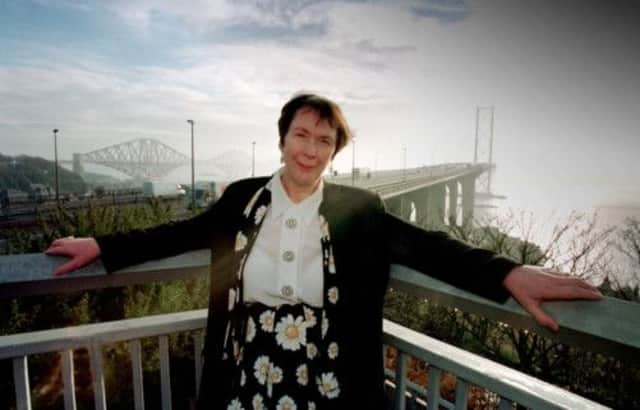Obituary: Helen Eadie, politician


Helen Eadie was one of the original members of the modern Scottish Parliament and remained there until her death. Friends said she was working on constituency business from her hospital bed in Dunfermline until the day before she passed away.
Helen Eadie did not like to make a big deal about it but history will show that she was in there – voted in there – at the beginning. She was MSP first for Dunfermline East and latterly Cowdenbeath and remained a lively, aggressive and outspoken MSP until her sudden death –only three weeks after she had been diagnosed with cancer.
Advertisement
Hide AdAdvertisement
Hide AdOnly a few days before that she had been campaigning for Cara Hilton in the Dunfermline by-election.
Eadie was a pioneering figure, the extent of her influence perhaps to be clear only after the independence referendum.
Helen Eadie made her mark on her nation. She was very Labour and very Scottish, and few could entwine the two like her.
Her adversaries across the party political spectrum, shocked by her death, agreed that she was a great Scot, a dynamo in making the Scottish legislature a factor not only in Scotland but in the lives of those Scots around the world who wondered if a Scottish Parliament could ever be a reality.
It did work, thanks to people like Helen Eadie. She was most definitely a pioneer.
As the victorious Labour candidate for Dunfermline East, she was enormously proud to represent her constituents in the first independent assembly Scotland had seen for 300 years.
No-one turned up with more enthusiasm than her at the first meetings of the new Scottish Parliament, first held in the General Assembly Hall of the Church of Scotland on the Royal Mile.
She later fended off journalists’ questions while the new parliament spent its homeless days variously at the chamber of Strathclyde Regional Council, at the University of Aberdeen and in the Lothian Regional Council’s offices on George IV Bridge before the current “state-of-the art” Scottish Parliament building opened to MSPs in 2004.
Advertisement
Hide AdAdvertisement
Hide AdCommenting on the Holyrood building, she was one of the first to express, with a wee bit of Fifer irony, that “state of the art reflects the state of art”.
In Holyrood House, Eadie became known as what the Americans call “feisty”. She fought for the poor, for the misunderstood young but also for the elderly people of Fife. It was natural to her.
She had seen homeless people in London while she was a student and she decided that giving them 20p rather thas 10p was not the answer. She therefore came home to Scotland not only as a councillor – for the Fife Regions – but as a counsellor for the many people who felt dispossessed.
Helen Stirling was born in Stenhousemuir on 7 March, 1947, and educated at Larbert Village, Larbert High and Falkirk Technical College. She got a degree in trade union studies from the London School of Economics. Her time in London, her intelligence and her charm, won her job at Westminster as assistant to Harry Ewing MP and was on the campaign team of Jim Callaghan, the Labour prime minister, before the days of high-tech party conferences.
Popular though she was, at Westminster, though, she felt she had to get back to “real people”, and those, she felt, to her, were in Scotland.
She worked for Fife Council, and was on the Committee on Equal Opportunities, a cause close to her heart, and the Transport Committee.
She felt that the least well-off in her community would have the greatest benefits from the local public transport system – not an easy thing to do, but Helen Eadie at least made major inroads.
Her father-in-law was the well-known Labour MP for Midlothian, Alex Eadie, who died last year in East Wemyss.
Advertisement
Hide AdAdvertisement
Hide AdIn Fife, she became a member of the regional council as well as an officer for the GMB trade union, working for equal opportunities and recruitment.
At Holyrood, Eadie was involved in many committees, including the North Sea Commission.
In 2007 she resigned from two of her committee posts in protest when a Conservative MSP became convenor of the equal opportunities committee.
A year before that she called for curfews for people under the age of 15 after being trapped in her car by a gang of young people in Cowdenbeath. She had been investigating concerns, voiced by her constituents, about anti-social behaviour, when the youths started rocking her car and throwing things at her.
Over the weekend Scottish Labour leader Johann Lamont said: “She played an important part in helping to establish the credibility of Holyrood. She will also be fondly remembered within the Scottish Co-operative movement.
“Her commitment to delivering change in our communities was the essence of her political beliefs and values.
“Helen was her own woman who didn’t fit the political stereotype. Perhaps that’s why some underestimated her, but her difference was why she was admired by the people of her constituency.”
Helen Eadie is survived by her husband Bob, a former councillor, two daughters, Fiona and Jemma, and three grandsons.